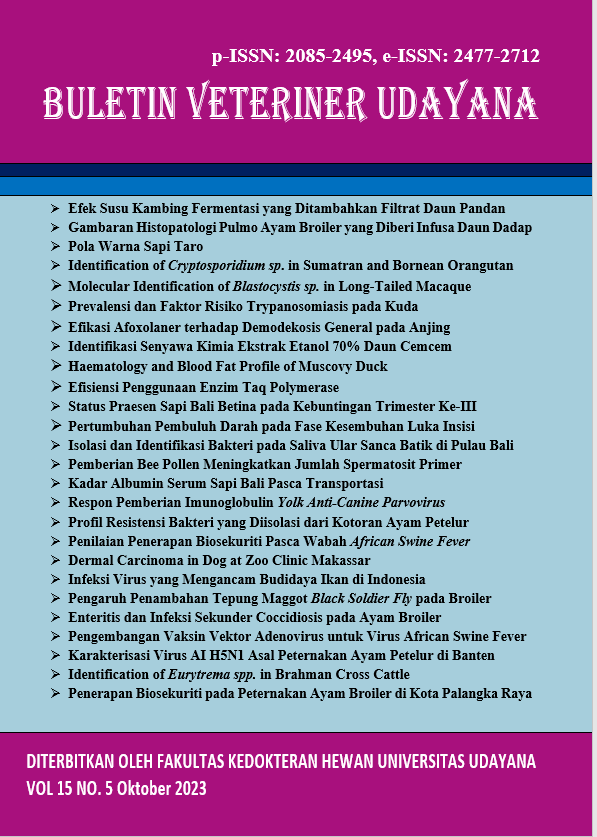AFOXOLANER EFFICACY AGAINST GENERAL DEMODECOSIS IN DOGS BASED ON SKIN HISTOPATHOLOGY
Abstract
Demodicosis is the most common skin disease found in dogs, caused by the proliferation of Demodex sp. mites. Based on the distribution of the lesions, demodicosis is divided into local and generalized. This study aims to determine the efficacy of Afoxolaner against General Demodicosis in dogs. A 1.5 year old mixed-breed male dog weighing 7.8 kg came to the Internal Laboratory, Faculty of Veterinary Medicine, Udayana University, with anorexia, weakness, and hair loss in the facial area, around the ears, neck, limbs, sides, back and extremities. On physical examination found alopecia, erythema all over the body, crusts, pustules in the medial caudal limb. Dogs exhibit high levels of pruritus. Routine haematological examination showed that the dog had anemia and leucocytosis. Diagnosis based on microscopic examination of deep skin scraping is Demodicosis. The prognosis in this case is fausta. Case dogs were treated with Afoxolaner (NexGard®), Azithromycin Dihydrate (10mg/kgBB, PO, q24h) and Chlorpheniramine maleate (4mg/day, PO, q12h) for a week. Histopathological examination of the skin before drug administration revealed pieces of demodex in the hair follicles, furunculosis, inflammatory cell infiltration of the stratum spinosum and dermis layer, necrosis accompanied by haemorrhagic exudate, follicular dilatation, and peri folliculitis. Post-therapy, the results of histopathological examination showed good results, with no pieces of mites found, the size of the follicle returned to normal, and no inflammatory cell infiltration was seen in the peri follicle. On the 10th day it was seen that the dog's condition had improved, the results of the skin scraping showed a reduced number of mites in one field of view. Afoxolaner should be given once a month for three months to eliminate and prevent mite infection in dogs.
Downloads
References
Beugnet F, Halos L, Larsen D, de Vos C. 2016. Efficacy of oral afoxolaner for the treatment of canine generalised demodicosis. Parasite. 23: 14.
Fourie J, Liebenberg L, Horak I, Taenzler J, Heckeroth A, Frénais R. 2015. Efficacy of orally administered fluralaner (BravectoTM) or topically applied imidacloprid/moxidectin (Advocate) against generalized demodicosis in dogs. Parasites Vectors. 8: 187.
Futagawa-Saito K, William BT, Naomi S, Tsuguaki F. 2006. Prevalence of virulence factors in Staphylococcus intermedius isolates from dogs and pigeons. BMC Vet. Res. 2: 4.
Gasparetto ND, Bezerra K, Soares LMC, Makino H, Oliveira ACS, Colodel EM, Almeida ABPF, Sousa VRF. 2018. Aspectos clínicos e histológicos da demodicose canina localizada e generalizada. Pesquisa Vet. Brasileira. 38(3): 496-501.
Gortel K. 2006. Update on canine demodicosis. Vet. Clin. Small Anim. 36(1): 229-241.
Halos L, Lebon W, Chalvet-Monfray K, Larsen D, Beugnet F. 2014. Immediate efficacy and persistent speed of kill of a novel oral formulation of afoxolaner (NexGard) against induced infestations with Ixodes ricinus ticks. Parasites Vectors. 7: 452.
Joanna N, Izdebska. 2010. Demodex sp. and demodicosis in dogs: characteristics, symptoms, occurrence. Bull. Vet. 54: 335-338.
Moneesh Thakur, Hriyadesh Prasad, Arya RS, Singh YD, Jayappa Kiran, Abhijit Deka, Kalyan Sarma, Albert Debbarma, Arindam Bhowmik, Prasenjit Debnath. 2019. Histopathological changes in canine demodicosis. Int. J. Curr. Microbiol. App. Sci. 8(03): 2176-2179.
Mueller RS. 2004. Treatment protocols for demodicosis: an evidence-based review. Vet. Dermatol. 15(2): 75-89.
Mueller RS, Bensignor E, Ferrer L, Holm B, Lemarie S, Paradis M, Shipstone MA. 2012. Treatment of demodicosis in dogs: 2011 clinical practice guideliner. Vet. Dermatol. 23(2): 86-e21.
Perego R, Spada E, Foppa C, Proverbio D. 2019. Critically appraised topic for the most effective and safe treatment for canine generalized demodicosis. BMC Vet. Res. 15(1): 17.
Rafdinal I, Amirudin, Azmilia N, Zuraidawati, Sayuti A, Zuhrawati, Daud R. 2016. Perbedaan jumlah leukosit setelah transplantasi kulit secara autograft dan isograft pada anjing lokal (Canis lupus familiaris). J. Med. Vet. 10(2): 144-146.
Rather PA, Hassan I. 2014. Human demodex mite: the versatile mite of dermatological importance. Indian J. Dermatol. 59(1): 60-66.
Sivajothi S, Reddy BS, Rayulu VC. 2015. Demodicosis caused by Demodex canis and Demodex cornei in dogs. J. Parasit. Dis. 39(4): 673-676.
Scott DW, Miller WM, Griffin CE. 2001. Parasitic skin diseases. In: Di Berardino, C., editors. Muller and Kirk’s Small Animal Dermatology. 6th ed. W.B. Saunders Company, Philadelphia, PA. Pp. 423-516.
Shoop WL, Hartline EJ, Gould BR, Waddell ME, McDowell RG, Kinney JB, Lahm GP, Long JK, Xu M, Wagerle T, Jones GS, Dietrich RF, Cordova D, Schroeder ME, Rhoades DF, Benner EA, Confalone PN. 2014. Discovery and mode of action of afoxolaner, a new isoxazoline parasiticide for dogs. Vet. Parasitol. 201: 179-189.
Singh SK, Kumar M, Jadhav RK, Saxena SK. 2011. An update on therapeutic management of canine demodicosis. Vet. World. 4: 41-44.
Solanki JB, Hasnani JJ, Panchal KM, Naurial DS, Patel PV. 2011. Histopathological changes in canine demodicosis. Haryana Vet. 50: 57-60.
Widodo S, Sajuthi D, Choliq C, Wijaya A, Wulansari R. 2011. Diagnostik klinik hewan kecil. Edisi Pertama. Bogor. IPB Press. Pp. 10-62.





